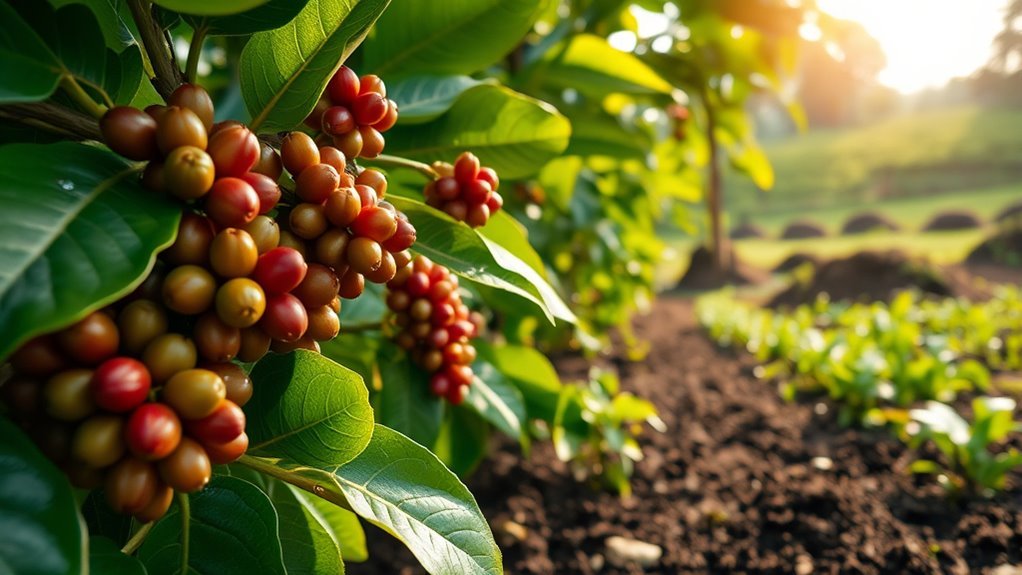The Impact of Coffee on the Environment: Sustainable Practices
You might not realize it, but coffee farming can harm ecosystems through deforestation, pesticide use, and high water demand. Thankfully, sustainable practices like organic farming, shade-grown coffee, efficient irrigation, and eco-friendly processing reduce these impacts. Supporting Fair Trade and energy-saving methods also helps protect biodiversity and lower carbon footprints. By choosing sustainably grown coffee, you actively contribute to healthier environments and communities. Explore further to discover how these efforts truly make a difference.
Environmental Challenges in Coffee Cultivation
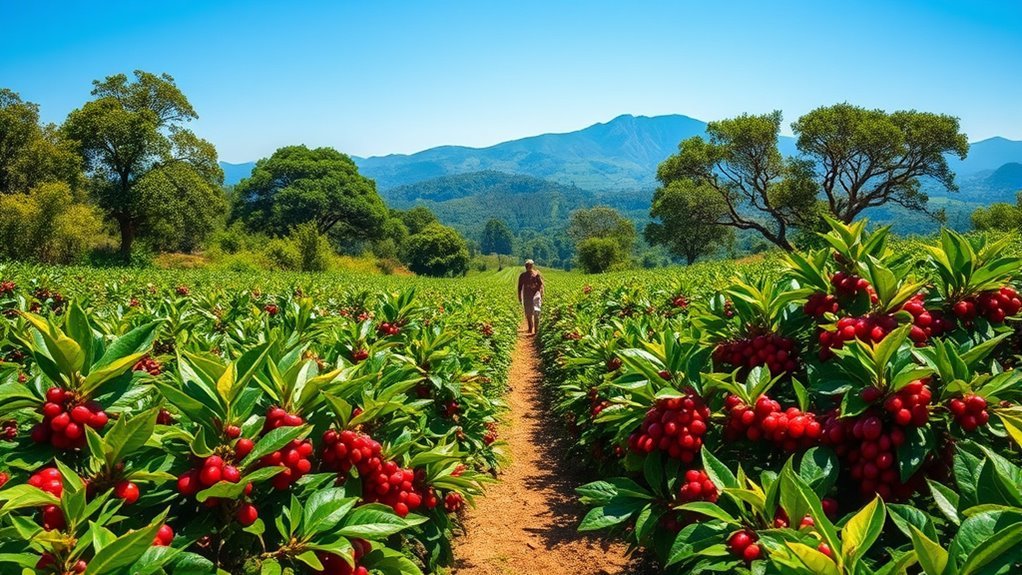
Although coffee is one of the most popular beverages worldwide, its cultivation poses significant environmental challenges that you might not be aware of. Coffee pests frequently threaten crops, leading farmers to rely heavily on chemical pesticides that damage ecosystems and restrict your freedom to enjoy a healthy planet. However, adopting sustainable fertilizers can reduce this dependency, promoting soil health and biodiversity. These eco-friendly alternatives not only control pests naturally but also minimize water contamination, preserving essential resources for communities like yours. By understanding these challenges, you can advocate for and support coffee farming practices that respect the environment and your right to a cleaner world. Choosing sustainably grown coffee empowers you to break free from harmful agricultural cycles and contribute to a more balanced ecosystem.
Deforestation Linked to Coffee Farming
Beyond the impact of pesticides and fertilizers, coffee farming also drives deforestation, threatening essential ecosystems you care about. Rising deforestation rates are often linked to expanding coffee plantations, especially when forests are cleared to establish coffee monoculture. This practice strips away biodiversity, disrupts wildlife habitats, and reduces carbon sequestration, undermining ecological balance. When you support unsustainable coffee production, you’re indirectly endorsing this environmental degradation. However, you have the power to encourage change by choosing coffee grown under shade or agroforestry systems that preserve forest cover. By demanding transparency and sustainability, you help lower deforestation rates and protect the freedom of natural landscapes. Your coffee choices can either fuel deforestation or foster a future where both farmers and forests thrive.
Water Usage and Pollution in Coffee Production
You might not realize how much water coffee production demands, often straining local supplies in growing regions. On top of that, the processing stage can introduce pollutants into nearby waterways, harming ecosystems and communities. Understanding these impacts is essential if we want to make coffee more sustainable for the planet.
Water Consumption Challenges
When coffee is grown and processed, it demands a significant amount of water, which poses serious challenges for both producers and the environment. You might not realize it, but water scarcity is a growing concern in many coffee-growing regions, where overuse strains local supplies. To protect your freedom to enjoy coffee sustainably, it’s essential to support farms adopting efficient irrigation techniques—like drip irrigation—that minimize water waste. These methods not only reduce environmental impact but also help farmers adapt to unpredictable climates. By understanding the water consumption challenges behind your daily cup, you can advocate for smarter water management in coffee production. This way, you’re helping safeguard water resources, ensuring that coffee remains a sustainable pleasure rather than a burden on our planet’s fragile ecosystems.
Pollution From Processing
Water management doesn’t stop at growing coffee—it extends deeply into the processing stage, where water use and pollution become significant concerns. When coffee cherries are processed, large volumes of water are used, often resulting in polluted wastewater rich in organic matter and processing emissions. If untreated, this waste harms local ecosystems and limits your freedom to enjoy a clean environment.
To minimize impact, consider these eco friendly methods:
- Water Recycling: Reuse water during processing to cut consumption and reduce wastewater.
- Wet Pulp Composting: Turning coffee pulp into compost prevents toxic runoff.
- Biological Treatment Systems: Using microbes to break down pollutants reduces harmful emissions.
Carbon Footprint of Coffee Supply Chains
Although you might not realize it, the carbon footprint of coffee supply chains extends far beyond the coffee cup you enjoy each morning. From cultivation and harvesting to transportation and roasting, each stage emits greenhouse gases contributing to climate change. But you have the power to influence this impact. By supporting sustainable sourcing practices, you encourage growers to adopt energy-efficient methods and reduce emissions. Additionally, many companies now engage in carbon offsetting initiatives, investing in projects that balance out their environmental impact. Choosing brands committed to these efforts means you’re not just savoring great coffee—you’re also promoting a freer, cleaner planet. Understanding the full carbon cost empowers you to make choices aligned with your values, ensuring your daily ritual doesn’t come at the earth’s expense.
Effects of Coffee Farming on Biodiversity
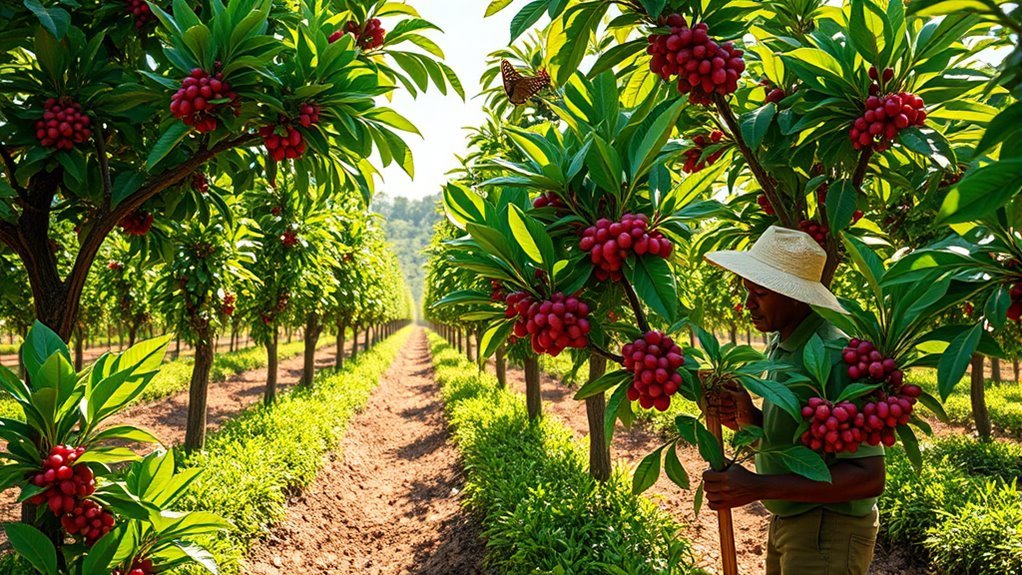
Because coffee farming often requires clearing land, it can substantially impact local biodiversity, affecting both plant and animal species. When you consider that many coffee farms are located in biodiversity hotspots, the consequences become clearer. By disrupting these areas, you risk losing essential ecosystem services that support life beyond just coffee plants.
Here’s what happens when coffee farming encroaches on natural habitats:
- Reduction in species diversity, threatening endemic plants and animals.
- Disruption of ecosystem services like pollination, water regulation, and soil fertility.
- Increased vulnerability of ecosystems to pests and diseases, harming long-term productivity.
If you value ecological freedom, understanding these impacts is key to supporting coffee practices that preserve biodiversity rather than deplete it.
Benefits of Shade-Grown Coffee Practices
You’ll find that shade-grown coffee practices play a vital role in preserving biodiversity by maintaining habitats for various species. These methods also help conserve soil quality and protect water resources, making coffee farming more sustainable. Understanding these benefits can change how you view the environmental impact of your daily cup.
Biodiversity Preservation
When you choose shade-grown coffee, you’re not just picking a brewing method—you’re supporting a farming practice that helps preserve biodiversity. This approach nurtures biodiversity hotspots by maintaining natural forest canopies, allowing countless species to thrive. It’s a form of habitat restoration that reverses the damage caused by conventional sun-grown coffee farms. By opting for shade-grown coffee, you contribute to:
- Protecting diverse wildlife, including birds and insects essential for ecosystem health.
- Preserving native plant species that sustain local ecosystems.
- Supporting farmers who prioritize ecological balance over short-term yields.
Your choice empowers freedom—from environmental degradation and monoculture farming—by actively sustaining a rich, balanced ecosystem. Selecting shade-grown coffee means you’re part of conserving our planet’s natural heritage while enjoying your daily cup.
Soil and Water Conservation
Beyond supporting biodiversity, shade-grown coffee plays an essential role in conserving soil and water resources. When you choose shade-grown coffee, you’re actively promoting healthier soil and enhanced water retention. The canopy reduces soil erosion by protecting the ground from heavy rains and wind, maintaining soil health. Plus, the organic matter from fallen leaves enriches the soil, improving its structure and fertility. Water retention increases as shade trees moderate temperature and evaporation rates, ensuring your coffee plants get steady moisture without excessive irrigation.
| Shade-Grown Coffee Benefits | Environmental Impact |
|---|---|
| Protects soil from erosion | Maintains soil health |
| Enhances water retention | Reduces need for irrigation |
| Adds organic matter | Supports sustainable farming |
You’re not just drinking coffee—you’re embracing freedom through sustainable choices.
Organic Coffee Farming and Its Environmental Impact
Although organic coffee farming requires more labor and careful management, it markedly reduces the environmental harm caused by conventional methods. When you choose coffee with organic certification, you’re supporting sustainable practices that protect biodiversity and maintain soil health. This approach eliminates synthetic pesticides and fertilizers, letting the ecosystem thrive naturally. You’ll notice these key benefits:
Choosing organic coffee supports sustainable farming that protects biodiversity and enhances soil health naturally.
- Soil Preservation: Organic methods improve soil structure and fertility, preventing erosion.
- Water Conservation: Reduced chemical runoff keeps nearby water sources cleaner.
- Biodiversity Protection: Organic farms foster habitats for various species, promoting ecological balance.
Fair Trade Coffee and Sustainable Development
Since fair trade coffee guarantees that farmers receive a fair price for their crops, it plays an essential role in promoting sustainable development. When you choose fair trade coffee, you support ethical sourcing that empowers farmers, ensuring they gain economic freedom and invest in their communities. The fair trade benefits extend beyond just fair wages; they promote environmental stewardship by encouraging sustainable farming practices that protect biodiversity. By demanding ethically sourced coffee, you push the industry towards transparency and social responsibility. This connection between fair compensation and environmental care creates a cycle of sustainability, where farmers don’t have to exploit natural resources to survive. Ultimately, your choice to buy fair trade coffee isn’t just about flavor—it’s a stand for freedom, justice, and a healthier planet.
Innovations in Eco-Friendly Coffee Processing
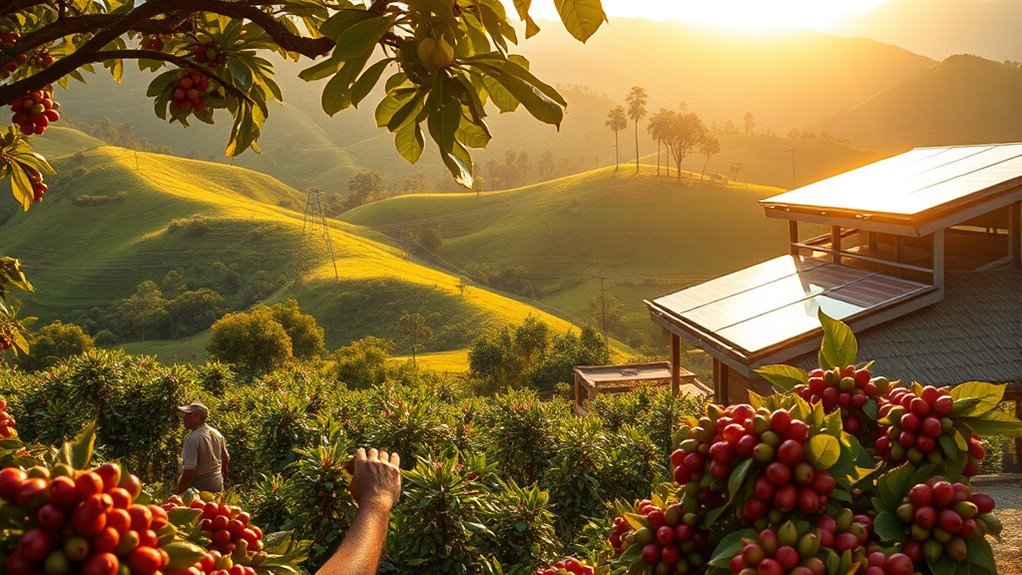
You’re probably unaware of how much coffee processing impacts the environment, but new innovations are changing that. By adopting waste reduction techniques and energy-efficient methods, producers are cutting their ecological footprint considerably. Understanding these advances shows how sustainable coffee can be both eco-friendly and economically viable.
Waste Reduction Techniques
When coffee producers embrace innovative waste reduction techniques, they not only minimize environmental impact but also enhance sustainability throughout the supply chain. You can support these efforts by understanding key methods that turn waste into valuable resources. First, composting coffee grounds transforms organic waste into nutrient-rich soil, reducing landfill burden. Second, recycling coffee byproducts into biofuels or packaging materials cuts down on resource consumption and pollution. Third, implementing closed-loop systems guarantees minimal waste escapes into the environment. These approaches empower producers and consumers alike to break free from harmful cycles and foster a regenerative coffee industry. By choosing coffee brands that prioritize such waste reduction techniques, you contribute to a more sustainable future while enjoying your daily brew guilt-free.
Energy-Efficient Processing
Building on waste reduction methods, energy-efficient processing represents another powerful way to shrink coffee’s environmental footprint. You can embrace innovative processing technologies that optimize energy use, integrating energy recovery systems that capture and reuse heat during drying or roasting. These advancements not only lower operational costs but also reduce greenhouse gas emissions, giving you more freedom from traditional energy constraints.
| Technology | Energy Savings (%) | Environmental Benefit |
|---|---|---|
| Heat Recovery Systems | 30-50 | Reduces waste heat emissions |
| Solar Dryers | 40-60 | Cuts fossil fuel reliance |
| Efficient Roasters | 20-35 | Lowers energy consumption |
| Water Recycling Tech | 25-40 | Minimizes water and energy use |
| Biomass Boilers | 50-70 | Uses renewable energy sources |
How Consumers Can Support Sustainable Coffee Choices
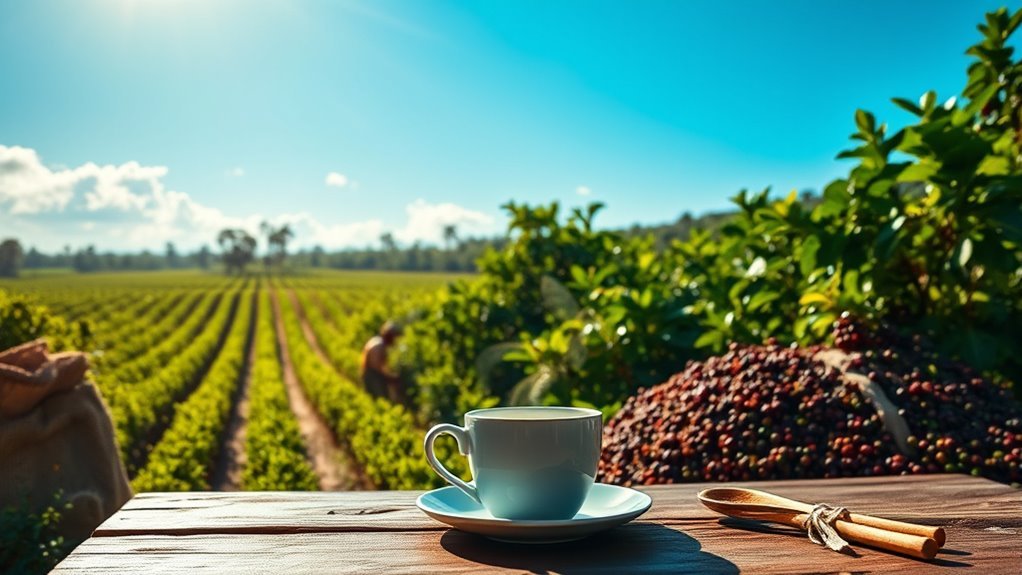
Although the choices you make as a coffee consumer might seem small, they have a significant impact on promoting sustainability within the industry. By embracing ethical sourcing and boosting your consumer education, you can drive demand for environmentally responsible coffee.
Your coffee choices, though small, powerfully promote sustainability and ethical sourcing in the industry.
Here’s how you can support sustainable coffee choices:
- Choose ethically sourced coffee: Look for certifications like Fair Trade or Rainforest Alliance to guarantee farmers receive fair wages and practice eco-friendly methods.
- Educate yourself: Understand the environmental and social footprint of your coffee to make informed decisions.
- Support local and transparent brands: They often prioritize sustainability and can provide detailed information about their sourcing.
Your freedom to choose can reshape the coffee market, pushing it toward sustainability and empowering communities worldwide.
Frequently Asked Questions
How Does Coffee Waste Contribute to Environmental Pollution?
You might not realize it, but coffee waste is a significant pollution source. When discarded improperly, it releases methane, a potent greenhouse gas, and contaminates water supplies. This waste clogs landfills and contributes to soil degradation, limiting your freedom to enjoy a clean environment. By understanding how coffee waste harms ecosystems, you can advocate for smarter disposal methods, reducing pollution and protecting the planet’s health for your future adventures.
What Role Do Coffee Cooperatives Play in Sustainability?
You’ll find coffee cooperatives essential in promoting sustainability because they offer cooperative benefits like fair pricing and shared resources. These cooperatives boost community engagement by empowering local farmers to adopt eco-friendly methods and protect their land. By supporting them, you’re encouraging a system that values both people and the planet, giving you the freedom to enjoy coffee that’s ethically produced and environmentally responsible.
Can Coffee Packaging Be Made More Eco-Friendly?
Did you know that over 30 billion coffee cups end up as waste annually? You can help change that by choosing packaging made from biodegradable materials and compostable options. These eco-friendly alternatives break down naturally, reducing landfill waste and pollution. By opting for sustainable packaging, you’re not just enjoying your coffee—you’re embracing freedom from harmful environmental impact. It’s a simple, powerful way to make your daily ritual greener and more responsible.
How Does Climate Change Affect Coffee-Growing Regions?
You’ll find that climate change challenges coffee-growing regions by altering temperature and rainfall patterns, threatening crop yields. To maintain climate resilience, farmers must embrace agricultural adaptations like shade-grown coffee or drought-resistant varieties. These strategies not only protect your favorite brew but also preserve growers’ livelihoods and freedom to innovate. Supporting these adaptations empowers both the environment and the people who cultivate coffee, making your daily cup more sustainable and secure.
Are There Certifications Specifically for Sustainable Coffee Farms?
Think of sustainable certifications like a compass guiding you through a forest of coffee options. Certifications such as Rainforest Alliance, Fair Trade, and USDA Organic guarantee coffee farms use organic practices that protect ecosystems and workers. These labels help you choose brands committed to environmental stewardship and social equity, empowering you to support freedom for farmers and the planet. By picking certified coffee, you actively promote a sustainable future, making your daily cup more meaningful.
